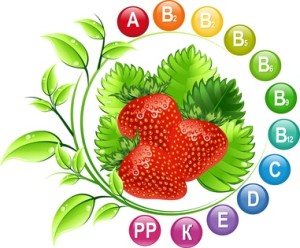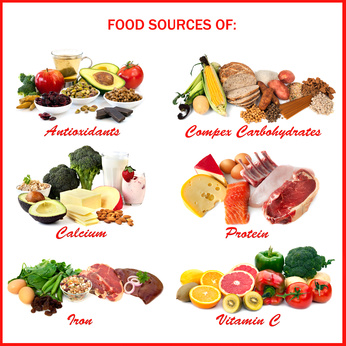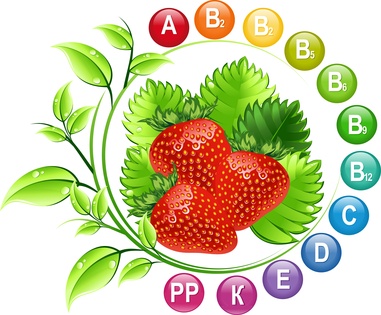 As surprising as it may sound, most of us are more vitamin deficient than we may apparently think. It is believed that vitamin deficiency correlates more in third world countries – but sadly, it is just as prevalent in developed countries.
As surprising as it may sound, most of us are more vitamin deficient than we may apparently think. It is believed that vitamin deficiency correlates more in third world countries – but sadly, it is just as prevalent in developed countries.
Before you can reach out to treat your deficiency, it is necessary to first be aware of how you can weigh your overall health to look out for ominous symptoms of vitamin deficiency. It is after doing so that you can supplement your diet with appropriate nutrients. Below is a wonderful guide to find out if you’re vitamin deficient.
1. You have recently lost appetite and your weight
Losing weight is a very symptom that must never be ignored. Combined with a lack of appetite, it can indicate that you have some vitamin deficiency. You can also closely observe the change in the color of your tongue and gums (may show inflammation with bright red color) to rule out other causes of weight loss. Most of the times, it is your vitamin deficient diet that is causing your dis-interest in food and loss of weight.
2. You feel easily fatigued, lethargic and bored
A balanced diet is sure to keep you fully energized and optimally focused. If you feel easily disturbed and experience overall body weakness, pain in joints and muscles, then the culprit might be your diet that is significantly lacking in essential vitamins. Well, it’s time to tune up your menu.
3. You experience lack of concentration and mental acuity
Quite evidently, if you really feel that you are doing worse than yesterday on a maths test or general routine calculation or creative work, it could be your brain’s slow activity is due to insufficient oxygen supply. You need to consume enough nutrients in order to ensure full functionality of your brain activity and cognition.
4. You go through frequent sore throat
Yes, we all believe that a mild, irritating sore throat is mostly a bacterial or viral infection, but it could be more: vitamin deficiency. Frequent sore throat can easily get neglected because it hardly tends to interrupt our daily life, but when it recurs exclusively, it is surely time to think that your diet is lacking in some vitamins, especially vitamin C.
5. You deal with chronic diarrhea
Lack of vitamin intake can usually result in loss of water from the body, leading to chronic dehydration and life-threatening loss of body salts and minerals. If you have on and off diarrhea for more than 2 weeks now, suspect some vitamin deficiency. For one thing, you diet is definitely not rich in fiber, and yes, it is also poor in many vitamins and minerals that enhance gut function.
life-threatening loss of body salts and minerals. If you have on and off diarrhea for more than 2 weeks now, suspect some vitamin deficiency. For one thing, you diet is definitely not rich in fiber, and yes, it is also poor in many vitamins and minerals that enhance gut function.
6. You feel temporary numbness of limbs, nervousness and irritability
One big symptom that most people have is tingling of their hands and feet when they have pure vitamin deficiency. When this occurs repeatedly, it’s time to take note and boost up the nutrition content of your diet. Prickling and burning of body parts, feeling an immense urge to itch with numbness are sure signs of lack of body vitamins.
7. Your gums bleed frequently and you have an overall increased tendency to bleed
Certain vitamin deficiencies tend to decrease the blood’s coagulation tendency. Your body becomes prone to excessive bleeding. The wounds will take longer to heal, or not heal at all. Your gums will especially bleed without any prominent pathologic cause. When this occurs, know that you’re vitamin deficient.
8. You experience regular muscle cramps and joint pain
 With vitamin deficiency, you will have a holistic range of symptoms from all systems of your body – and your locomotory system is just as equally affected. If you happen to have regular muscle tenderness, loss of muscle tone, irregular tendon reflexes, any bone deformity and frequent joint pain, then you must consider revving up your menu with a vitamin overload to counter these symptoms.
With vitamin deficiency, you will have a holistic range of symptoms from all systems of your body – and your locomotory system is just as equally affected. If you happen to have regular muscle tenderness, loss of muscle tone, irregular tendon reflexes, any bone deformity and frequent joint pain, then you must consider revving up your menu with a vitamin overload to counter these symptoms.
9. Your eyes burn, itch and produce excessive tears
Especially with vitamin A deficiency, eyes tend to get affected the most. Eyes produce unnecessary tears with redness, itching and severe burning sensation. If vitamin deficiency is not corrected in time, it may even lead to permanent damage to visual acuity. It is important to have regular eye checkups and a good diet rich in vitamins, especially vitamin A.
10. You have night blindness, photophobia and dry eyes (xerophthalmia)
Again, eyes are very vulnerable to vitamin deficiency, especially vitamin A deficiency. In case of poor vision at night, feeling high sensitivity to bright light (photophobia) and normal vision loss without any apparent trauma or disease, consider vitamin deficiency. Eyes also get dry, and at times produce more tears in response, due to vitamin A deficiency too.
Summing it all up, it is crucial to identify the root cause of your symptoms to effectively and timely treat your problem and avoid complications. Vitamin deficiency is more common in our population than the statistical data reveals. It is therefore mandatory to keep a tight check on our diets and observe our body’s behavior. With the knowledge of major symptoms that your body might show, you can now readily either correct the problem yourself or seek expert medical care.
Johanna Oosterwijk N.D.
Shambhala Wellness


